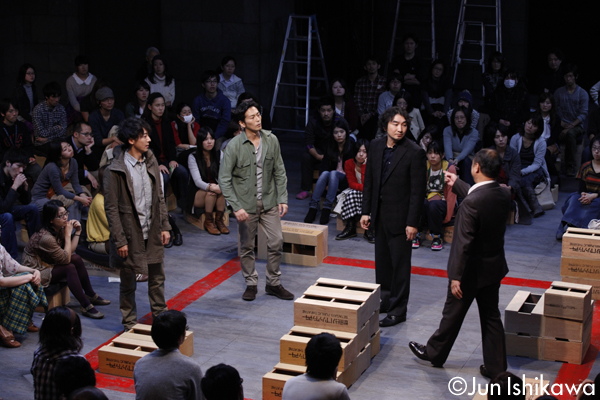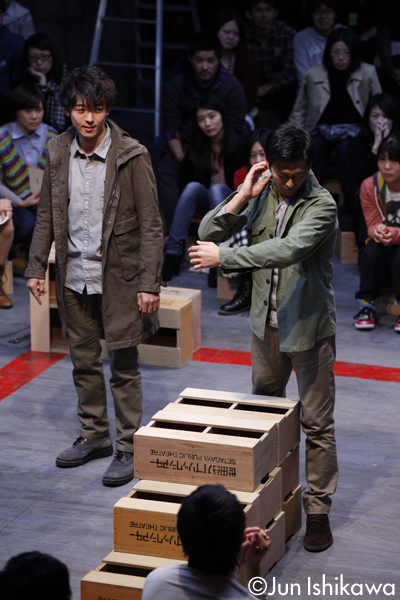At the start, there is a black box on the stage and five men emerge as if from nowhere to draw slips of paper from it. It appears that the roles they are to play are written on the slips of paper.
The first to speak is “F” playing the role of a juror. He says that as a juror in a trial by jury he has given the death sentence to a young man accused of killing several people at random. In the accused murderer’s lack of any apparent emotions, F sees glimpses of his own father, who has lost his job and lived on in idleness until his death.
Next “O” speaks. His role is that of the Minister of Justice who is reluctant to carry out death sentences. He is drinking and thinking about the suicide of his father, who was also a politician.
As the prison officer, “U” tells of working on a daily basis with prisoners sentence to death and how he consoles himself by speaking to a tree in the park about the pain of having to perform executions sometimes.
As the prisoner sentence to death, “R” recalls the indiscriminate killings he committed as “something that happened as if in a dream.” R goes back and forth between feelings of guilt for his crime and the “dream” state he recalls.
Out of their roles now, four of the characters are discussing each other’s role situations and the words that were spoken. The discussion turns into an argument and U walks away. The remaining three decide to change roles and proceed. When the “man” brings the box of roles, U returns and they draw roles again and begin speaking their parts in monologue.
Now in the role of the prison officer, F tells about becoming the person in charge of setting the noose for an execution by hanging, and due to a mistake he made, he caused a senior penal officer at his prison to fall into a state of emotional distress.
Now as the juror, U tells how a fellow worker made a confession to him about destroying his family because of an extramarital affair he has had, and then, before U’s eyes, the fellow worker jumps to his death.
In the role of Minister of Justice, R proclaims that as the new Minister he is going to order the execution of the young man accused of the indiscriminant murders.
As the sentenced killer, O asks himself if his death will be a fitting way to pay for his crime.
O stops his monologue to say that he feels uncomfortable with the character as the previous actor had portrayed him and can’t go on. The four actors decide to go back to their original roles, but the conversation ends there. Eventually, R, with the role of the sentenced killer, begins to speak to the other three, F, O and U.
F, O and U ask him about things like the motive and cause behind the killings, trauma from his youth and whether or not he feels guilt for what he did. R doesn’t give them any convincing answers. F becomes enraged and begins throwing punches at O and R, after which the men begin to lose control of themselves. They look as if they are all have some sort of connection with the indiscriminant killings.
As the argument heats up, an execution platform and hanging noose suddenly appear. Playing the role of the sentenced killer is R. U begins to make preparations for the hanging without pause. There is trepidation in F and O as they watch, but the hanging is carried out and they fulfill their role of verifying that the prisoner is dead. The “man” comes and picks up R, now the dead body, and carries him away.
With R now absent, the others begin their monologues on the assumption that they now know that the execution was carried out.
U tells about his reunion with the senior prison officer that had become emotionally disturbed. F relates that he has begun to rid himself of the memories of his fellow worker that committed suicide and O tells how he lost his position as Minister because some unacceptable remarks he had made about the execution while drunk were leaked to the press.
Suddenly the “man” begins to speak. He says that he went to the grave of one of the victims to report that the killer had been executed, but when he did he felt no sense that anything had really ‘ended’ with that. All he felt was a sense of ‘nothingness.’
F, O and U give their opinions of what has happened, but in the end they reach no conclusion within themselves about what atonement there can be for a murder.
R comes in carrying the role box and encourages everyone to draw and try it all again.
Now it is the “man” who sets off another dispute. He has received a report that his son had committed indiscriminant killings just at a time when the “man” had reached retirement age and was looking forward to living a quiet life in retirement with his wife. After the shock he experienced an inability to feel anything. He felt no sadness when he heard that the execution had been carried out, and then the “man” says, “This is the end of not feeling.”
The other four criticize the “man,” saying that what he has just said is ‘against the rules.’ Desperate to find alternative lines to substitute, F goes into a panic and runs off. The “man” suggests that they do it over again.
This time the “man” begins speaking new lines about a scene in May. He tells about seeing the glorious green of the trees and feeling the presence of something returning from the depths of despair to be reborn.
The “man” says, “Let’s open the window.”
Unnoticed, a strong light has shone in to envelope the four.




